
20 Years, 20 Lessons: Leadership, Growth & Resilience in HR Recruitment.
A 20-week series exploring key lessons from the CEO of a leading HR recruitment firm, built from a military background into a global business.
Richard Colgan
Group Founder & CEO

Week 8
Raising the Bar or Cobbler’s Children?
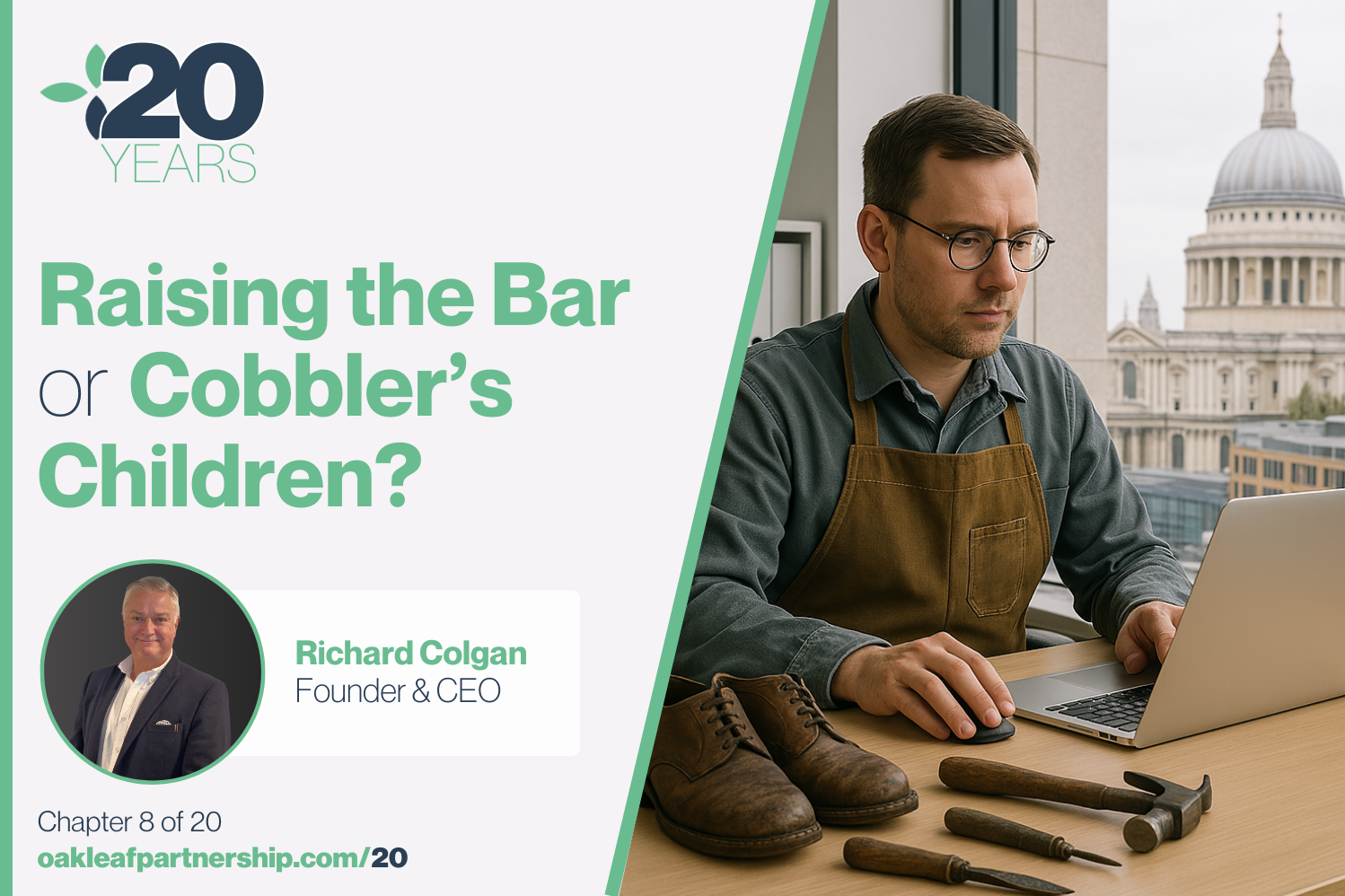
According to the HR Review this week, this has been a challenging start to 2025 for HR professionals across the UK (like 2024 was a walk in the park!), who are under pressure from economic forces, skills shortages and government policy, new research shows.
A recent survey from elementsuite, part of HR and payroll software company Zellis, reveals that more than 80 percent of respondents say recent National Insurance changes have negatively affected cost management and workforce planning. Meanwhile, 62.5 percent report that ongoing economic uncertainty has prompted changes in hiring strategies.
The article goes on to say that despite these issues, many HR professionals are taking a more strategic approach. A majority (74.5%) feel prepared to navigate economic changes in the year ahead. Over half (50.3%) remain optimistic about the business outlook. HR is now increasing its focus on long-term workforce planning, employee wellbeing and strategic decision-making.
Recruitment and retention remain problematic for many teams. While 62.5 percent of organisations have modified their hiring strategies, only 42.6 percent are confident in their ability to attract the right talent. On the flip side, a huge and recurrent problem for HR job seekers is poor customer experience.
In March 2012, I conducted my own research: “Raising the bar in HR recruitment – or is it the Cobbler’s Children?” which examined the HR sourcing paradox (a paradox, it would appear, is still going strong today). In this cost-above-everything, technology- and AI-obsessed world we live in, is it surprising that customer experience is suffering — or is it that HR is, once again, the Cobbler’s Child?
Back in 2012, 74% of respondents said that lack of culture fit was the number one reason for a failed hire, with only 11% saying they were happy with their hires 12 months after they started. I’ve often wondered if the AI algorithm is better able than a human to sift many hundreds of applications that I see almost daily on LinkedIn for senior HR roles — and also then reject them after explaining the reasons why they aren’t suitable. Given various recent conversations, this is obviously not the case.
In a heartfelt article last week on LinkedIn, Mark Cowie — a senior HR job-seeker and someone I’ve known for many years — talked about his job-seeking customer experiences. His themes are far from unique, sadly. He concludes his piece with: “It’s time to raise our game. Because culture isn’t something we declare – it’s something we deliver.” Feels like that delivery is off the mark at the moment.
Two slightly more concerning HR “themes” at the moment, given the numerous conversations I have had, relate to candidate gender (one member of my own profession allegedly stated that they wouldn’t bother with senior male candidates — no one will hire them), and also the age of the candidate (both male and female). I wonder if anyone reading this has any data or personal experiences to back these potential themes up?
So, I will leave you with a few questions:
• Is HR (still, or once again) the “Cobbler’s Child”?
• Are online applications appropriate for all levels of candidate sourcing?
• If yes, is the technology capable of making the initial cut (technical skills and “fit”) and replying in a sensible manner to all the rejected applicants?
• Does “fit” matter anymore — or is “fit” now discriminatory by definition (or is it the unspoken elephant in the room)?
• Is HR discriminating by gender and/or age?
Answers on a postcard.
Wishing you all a happy week — and with all that’s going on in the world, try to keep smiling! Until next time….
Week 7
Real tales from the annals
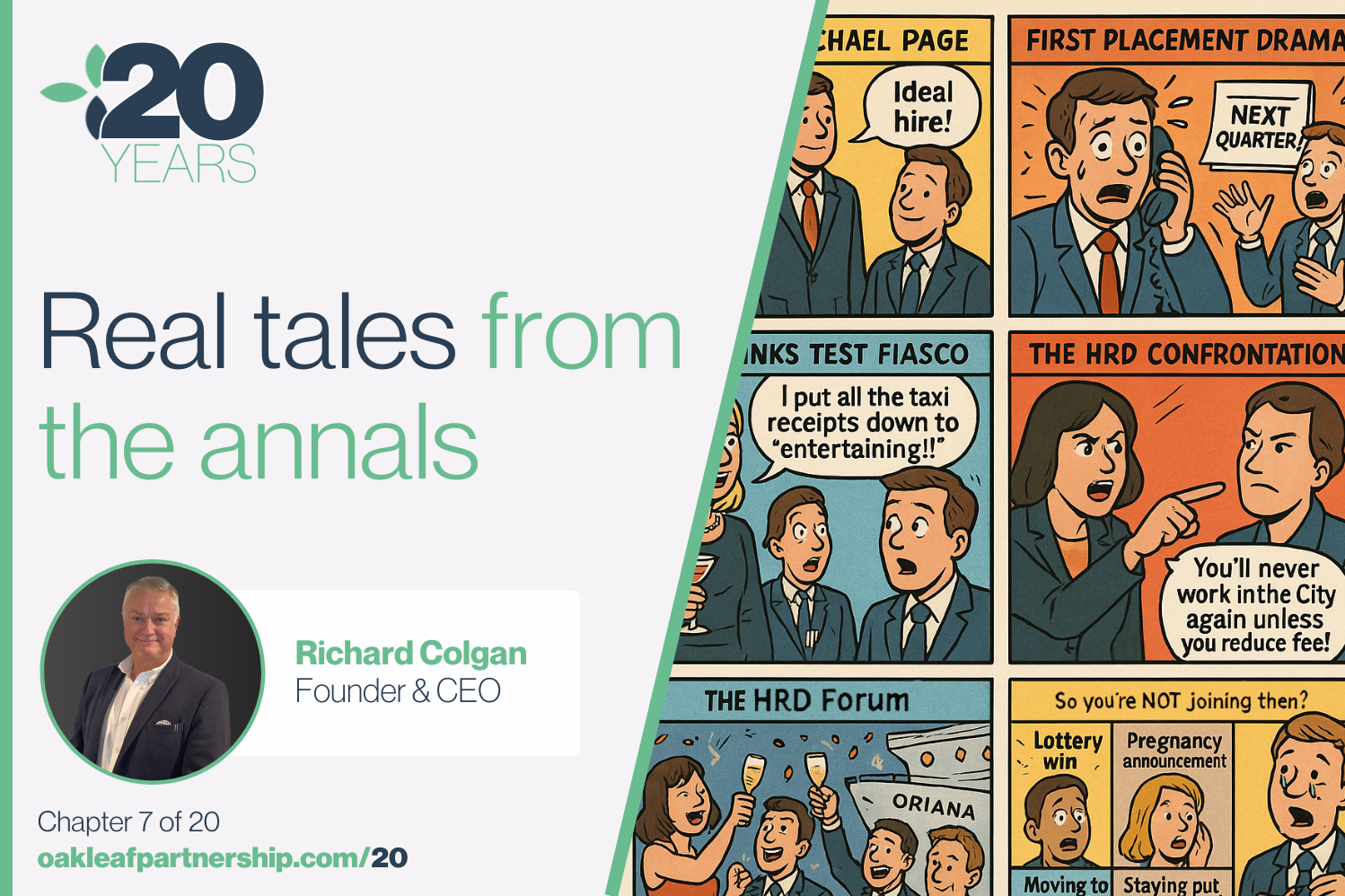
On Monday 4th September 1995, I joined Michael Page City after leaving the Army. On my first day, I was asked by an experienced Manager what my background was: wife, two young kids and a rental “two up, two down”….”Ideal hire” he replied!!
My first successful placement came (somewhat later than hoped) 4 months later. With two experienced Managers standing behind me and listening to my call, I asked the successful candidate when she was planning to resign. “Next Monday..” came the reply “My boss is away until then”. I was mortified as we accounted for the fee revenue upon resignation and Monday was in the NEXT QUARTER!!! I explained my predicament and she agreed to resign on the Friday (much to the animated chagrin of the two Managers listening!).
A frequent part of the recruitment process back in the day was the drinks test (and it was actually called that!). A VP level candidate had verbally accepted a role via me with one of the big European banks. The search process had been long but the fee was worth the wait. So not only did she get far too drunk, she also admitted to her boss-to-be that she “fiddled the odd taxi receipt now and again – like everyone does….”. The offer was withdrawn the following morning.
After a successful search assignment for a Director-level hire – the HRD confronted me at a drinks reception the following week and informed me in no uncertain terms “You’ll never work in the City again unless you reduce the fee”……
For those of you who have ever been on the HR Director’s Forum on The Oriana I won’t need to say any more. For those that haven’t been, suffice to say HR professionals certainly know how to let their hair down!
“Off the record, if you headhunt my number two out, you can have her replacement search exclusively”…..
The candidate who, having accepted a new role and resigned, calls on the Friday before the due start date on the Monday to say:
-
- “I’m staying put – they came back with more cash and a bigger role”
- “I’m relocating to Australia”
- “I’ve just found out I’m pregnant”
- “My husband won the lottery!”
One of my colleagues was working with a global luxury brand – the CPO called me up during the process to say she’d seen a fantastic CV for the role she was looking to recruit but……she already worked for one the company brands!! She assumed the hire would now be free and nothing else would be said! Yup- a free hire it was!
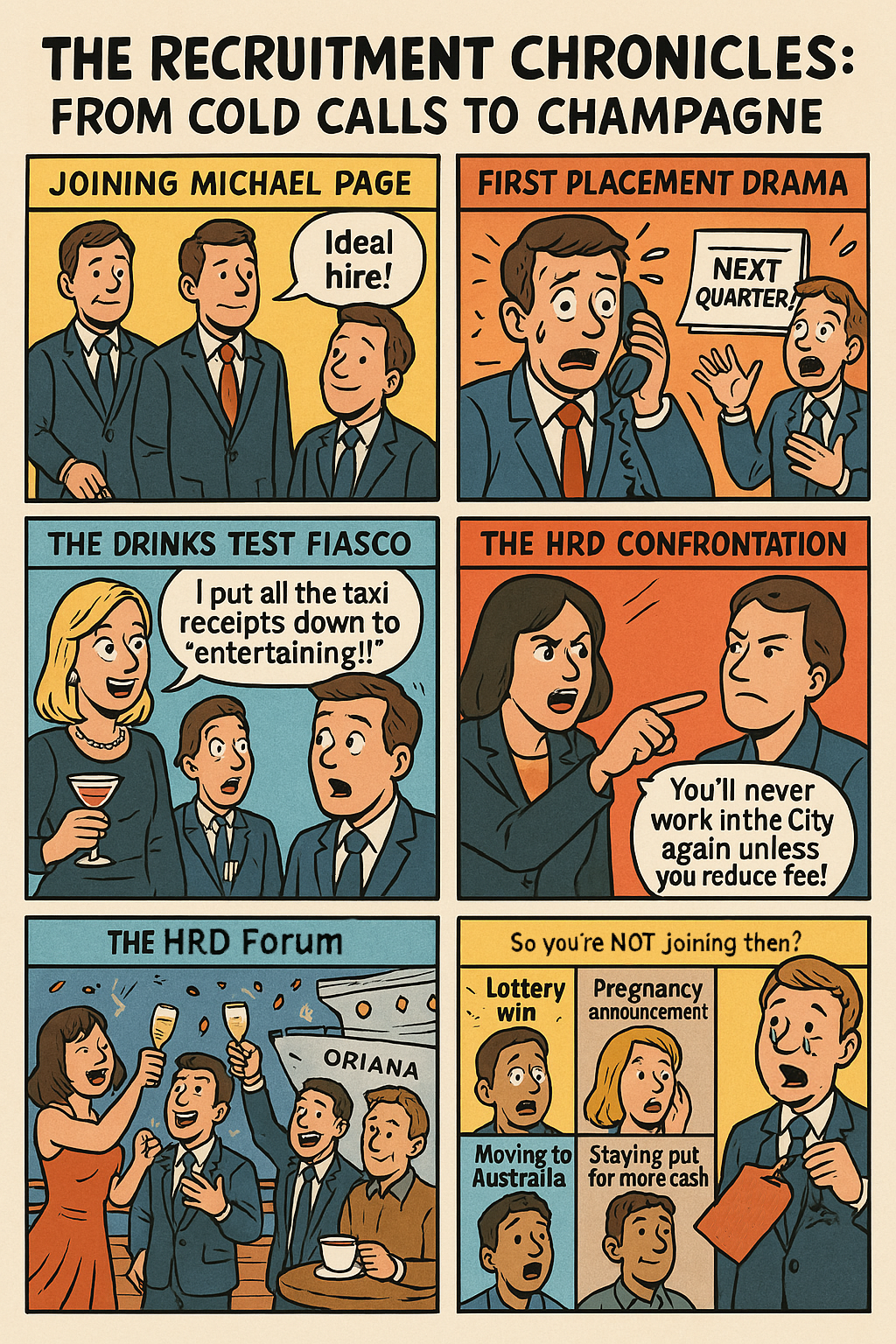
Week 6
The C word…
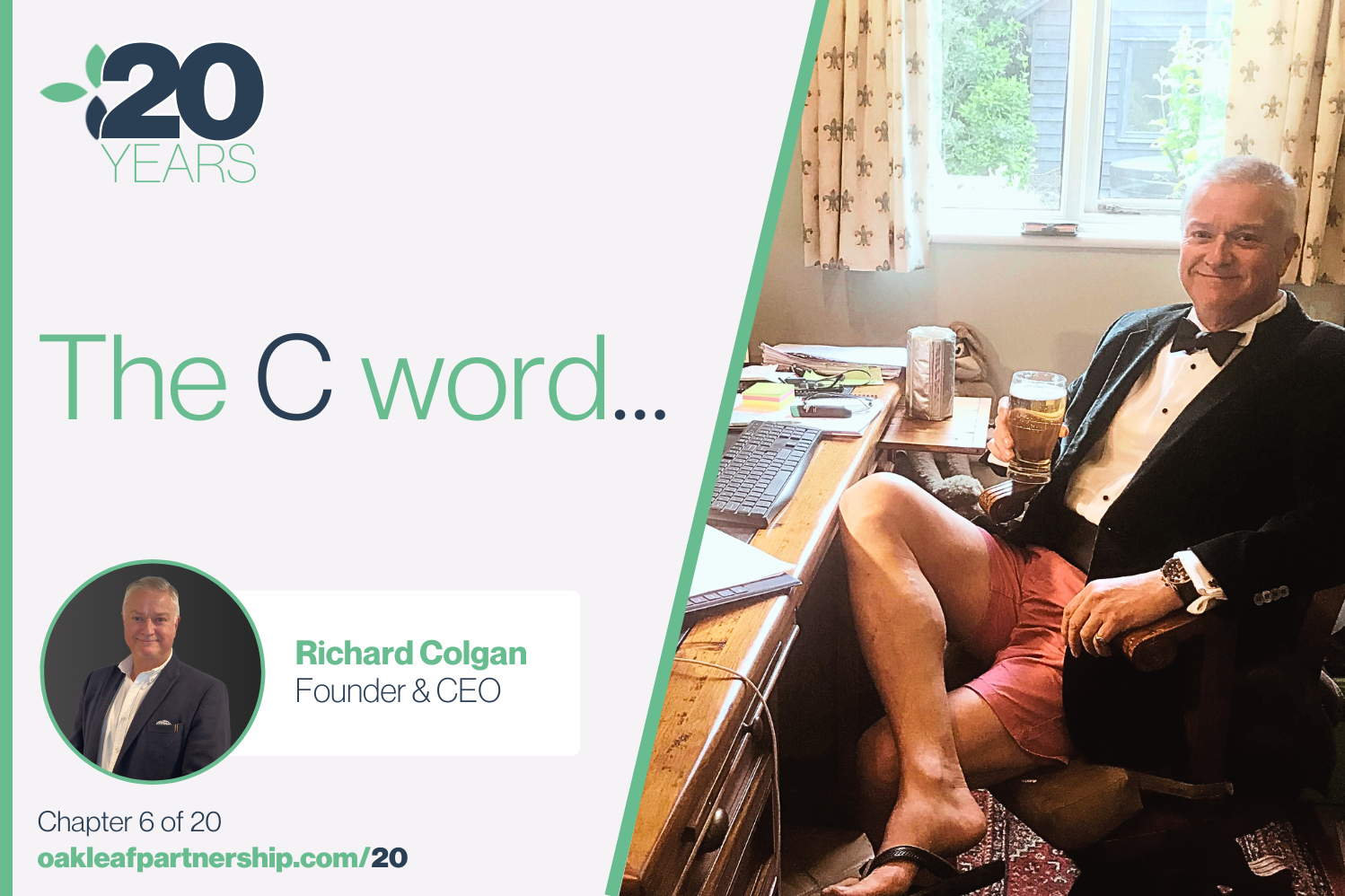
It’s hard to believe that it’s almost 5 years to the day that Boris ordered us into the first lockdown. As I surveyed the empty office a day later (pictured below) it all felt very surreal, with the empty London streets and the metaphorical tumbleweed drifting down Kingsway. I wasn’t scared (far too busy for self-pity) but it did feel profoundly sad. I’m not sure why, but one of the first things I did was dye my hair blonde (blonde dye on grey hair goes yellow sadly!) – I wasn’t going to seeing any customers anytime soon, was I!
Our ability to adapt to this “new” way of working was quite humbling and testament to the resilience and adaptability of all involved. We’d already adopted a WFH day every other Friday so the transition wasn’t as tough as it might have been – everyone had already moved to laptops. In a 2021 article from Forbes, Dr. Ekta Vyas states: “We saw the emergence of a new paradigm around change, highlighting our inner agility, innovative abilities and strength to seize opportunities.” Lockdown proved how adaptable we are and our strong appetite for continuous learning.
Peter Cheese, CEO of the CIPD, tells us in the latest edition of People Management that: “Talent was re-defined, not limited to geographical location, with staff being able to work from anywhere, meaning talent was everywhere.” Flexible working is certainly a lasting legacy of the pandemic.” The UK is, apparently, second in the current global leaderboard for days WFH. He goes on to state that: “Employee expectations have changed and businesses are not finding it easy to balance the increasingly pastoral role employers took on during the pandemic with the need for improvements in productivity and performance…” adding that “…the evidence is “mixed” on impacts on productivity and organisation cultures and cohesion.”
After an incredibly tough couple of years for the HR profession, 2022 was the year the austerity bubble burst – pent-up supply and demand joined hands in a feeding frenzy of recruitment. At one stage, nearly 40% of all our live vacancies were in TA and candidates were, across the board, getting 20-40% above (pre-Covid) market rates. Our own staff were being headhunted for similar amounts but I didn’t feel it to be morally correct to match the buy-back. The boom of 2022 (just like the post-GFC “false dawn” of 2011) soon turned into two years of recruitment recession – the Covid waves had eventually crested and broken. I believe we are still, globally, witnessing the impact of this, compounded (as ever) by geopolitical events and wars.
It’s not all doom and gloom, however. As I mentioned in an earlier article, the global recruitment market is projected to grow by 5% this year and our own numbers seem to be heading in the right direction. As before with the GFC, the C19 “shock” forced us to mitigate our own business risks and now have flourishing (“boots on the ground”) businesses in the US and geographical revenue streams from both Continental Europe and the Middle East. We also have a growing and profitable business in Tech, Change & Transformation. A few years of stability wouldn’t go amiss however!!
Until next time!
Week 5
“You’re not the best looker, are you….”

I had the honour to attend the Royal Military Academy, Sandhurst in 1987, followed by 9 years in the Army. The motto of the Academy is “Serve To Lead” and I’ve always been fascinated by, and an advocate of, the concept of “Servant Leadership”. In very simple terms, your soldiers get to eat and sleep before you and you have the right to get shot before they do! I’ve tried to live by this philosophy my entire adult life and have made sure it is at the very core of Oakleaf. I’ve also been fascinated by the inextricable link between leadership and culture. There are myriad books and articles on Leadership, however, in her excellent piece “Culture – It’s a collective” (LinkedIn – October ’24), Claire Silver, CPO at John Laing, says: “..when it comes to culture, we can all be leaders in our own right.” She goes on to state that “Culture might be shaped from the top, but it is up to the leaders throughout the organisation to bring it to life.”. Of course ,“Culture Eats Strategy For Breakfast”! In that very article of February 2020, The Alternative Board (TAB) state that: “Company culture happens whether you want it or not….and most of it is created by the business founders.” “With a proper strategy, you create the rules for playing, but culture defines the way the game will be played”.
“Culture is vulnerable and depends on the moods of the people who define it”.
I agree wholeheartedly with both Claire and TAB, however the problems seem to arise when that “mood” is floored and a climate of fear pervades, from the top down. Thinking back to the Global Financial Crisis (GFC), some of the major banks that fell appeared to be led by (whom were perceived at the time as) “outstanding leaders”: they demonstrated strong, unemotional decision making, they had superior IQs, they were charismatic, demonstrating a polished, almost charming, public persona, they were risk takers, they seemed to never sleep, they oozed confidence and invincibility. Over a fascinating lunch one day in 2012 (at the back end of the GFC) a subject matter expert on Neuro Diversity, suggested to me that he believed that many FTSE CEOs were on the spectrum. Some even demonstrated more extreme behaviours/ characteristics!
I have it on good authority that one (well known!) bank ex-CEO at a social function was alleged to have asked a colleague why one of the women [over there] appeared upset. “Confidentially” came the reply “her partner has just left her”. His opening gambit to her was: “So I hear your partner has left you…..well you’re not the best looker, are you”! Another bank ex-CEO allegedly held a global MDs conference call a few days before his firm went down on the Sunday. He told his MDs to buy company stock at a “once in a lifetime price” – they knew he would find out if they did not so many did spend millions on the stock. By Sunday evening their stock was worthless, and they were out of jobs.
Matt Nixon examines some of these concepts in his excellent 2016 book: Pariahs – Hubris*, Reputation and Organisational Crises. He examines (inter alia) the impact of power on individual and corporate decision making. It’s a fascinating read and, as a former Army officer, the historical military parallels are striking!
It appeared in the years following the GFC that all the lessons of the past had been learnt……apparently not!!
Until next time.
*Arrogant over confidence
Week 4
“The king is dead, long live the king”
The growth of LinkedIn and RPO
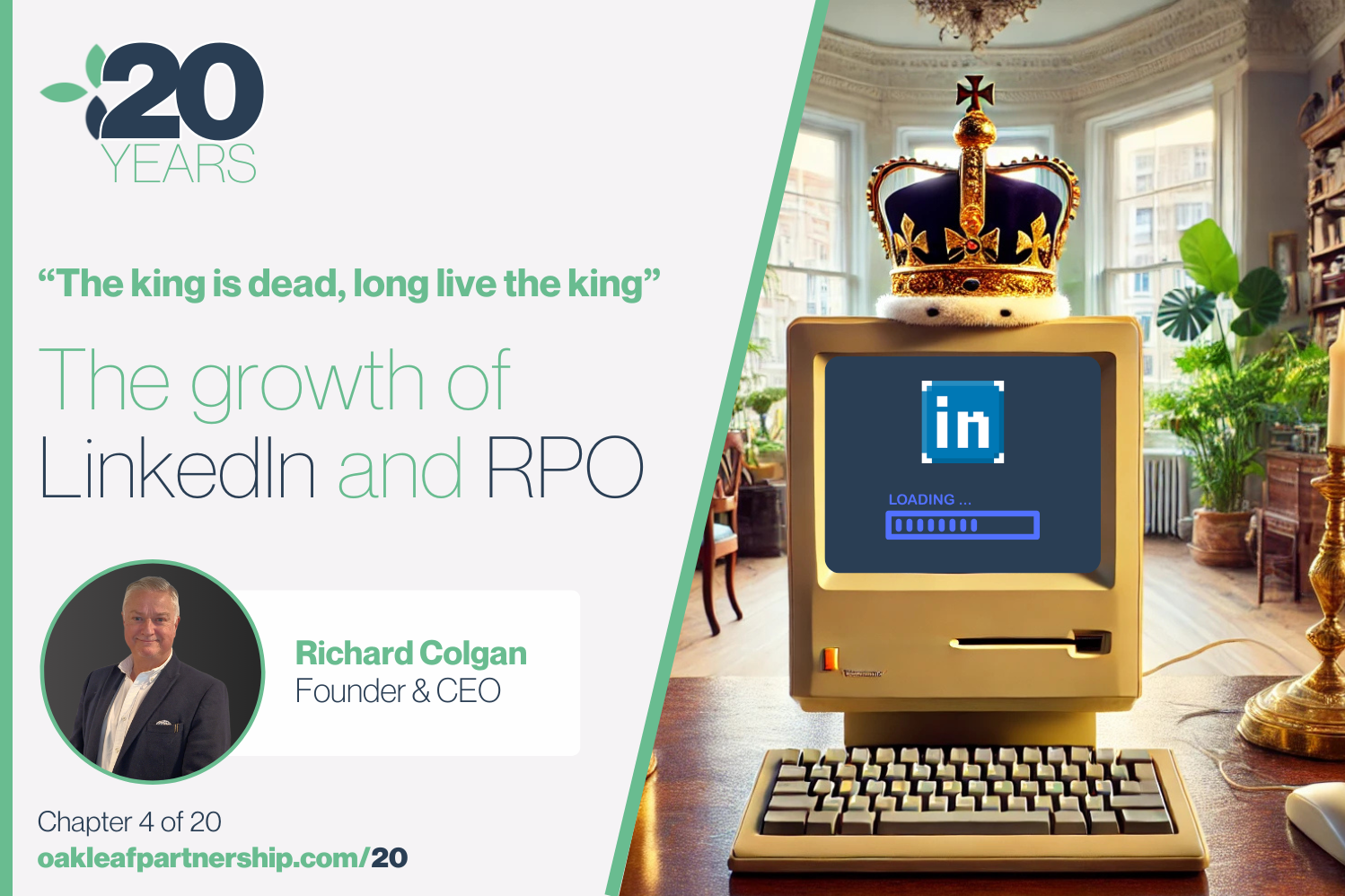
In the UK, the immediate economic recovery from the GFC witnessed the rapid growth of RPO and the wider adoption of LinkedIn usage. Well, I thought, that’s me out of a job then! Many in-house teams and RPOs initially thought the same! But here was the thing:
1. In-house teams were not HR discipline experts and were stretched super thin. They were often the “Cobbler’s Child”! HR seemed to fall in priority well below other areas that shouted louder!
2. As above, the RPOs were not HR experts and were stretched super thin also. Margins were already getting squeezed: rewards were based on time and cost to hire – not necessarily the best incentives for quality! The inability to discuss the hire with the hiring manager was definitely hindering the process: “don’t talk to line”!!
3. Perhaps not surprisingly, people only tended to update their on-line profiles when they needed to look for a new job: the lead indicator of someone in your team looking for a new role was a LinkedIn update!! This remains as true today as it did at the time.
4. Apparently, some individuals lied on their profiles! Ring any bells?
But who cared – a bum on a seat was all that was needed and time and cost of hire were critical. Few at the time ever measured success of hire! There really was initially a “one size fits all” approach to recruitment that failed to take in one key factor: the product and the protagonists were human!! I suspect in later articles I will be looking at the next existential threat – AI – and I wonder if the same themes will arise?
We all pretty soon realised that partnerships, based on honesty and delivery, were keys to success for both parties. It remains exactly the same today. And more so than ever, we need to clearly define our value position.
Here are Oakleaf’s:
- A brand associated solely with HR, with a holistic view of the Profession
- 20 years in partnership with the HR community
- Global reach – UK, Europe, the Americas and the Middle East
- Deep technical, sector and geographical expertise
- Outstanding customer service, speed of response and delivery
- A network of both passive and active HR talent that is second to none
After a 2-year decline, according to various recent research papers, the global recruitment industry is expected to see a growth rate of around 5% in 2025, with the market potentially reaching a size of approximately $650bn. It appears that reports of my death have been greatly exaggerated!
Why Oakleaf?
Oakleaf Partnership Oakleaf Partnership is the leading independent HR recruitment and Executive HR Search business in the UK. Over the last 19 years we have built the business on the foundations of outstanding customer service and enduring relationships within the broader HR community with clients from across every industry sector, thanks in part to our expertise but also our highly collaborative approach.
Week 3
Initial Shock
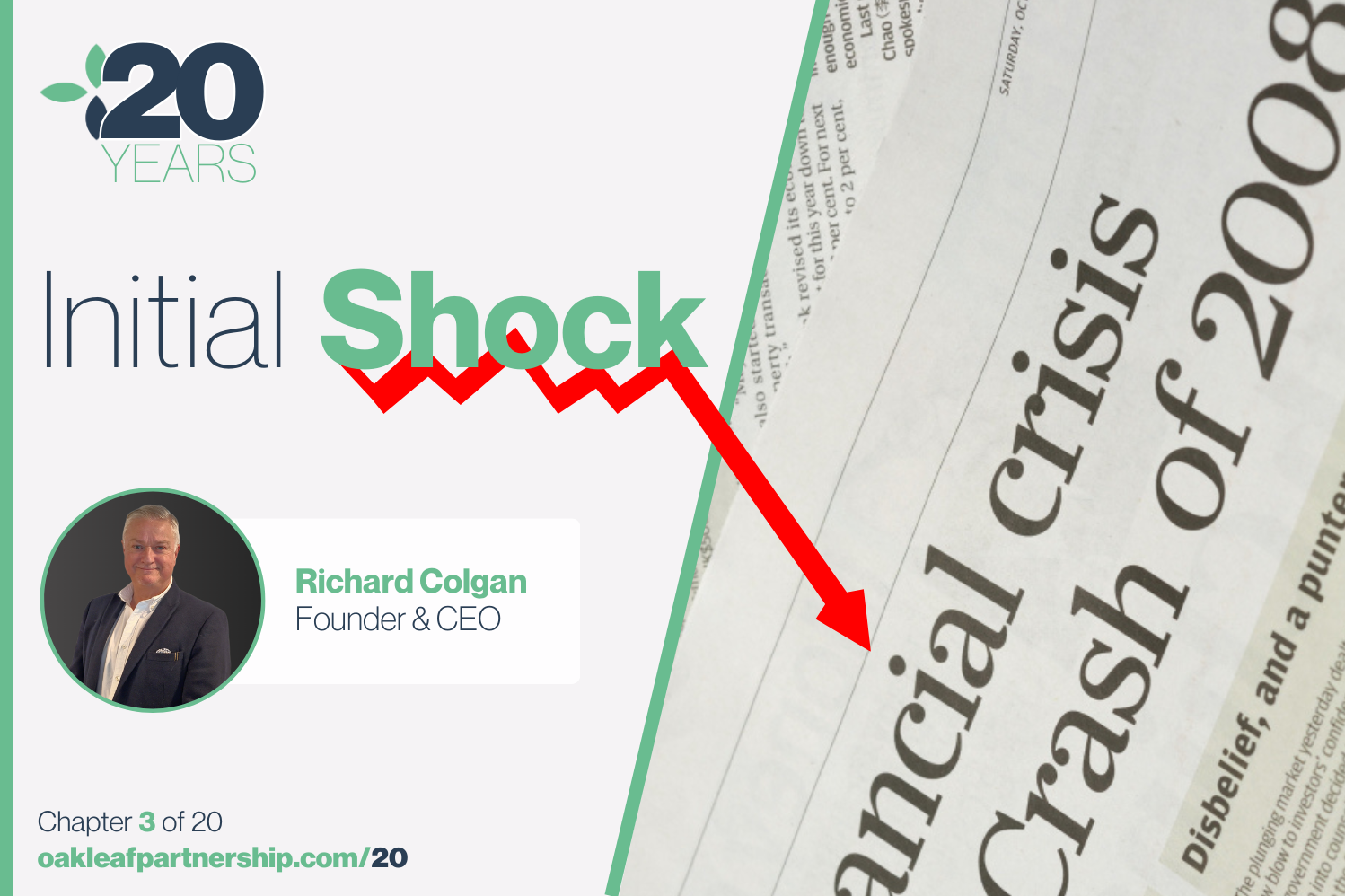
The initial shock of the Global Financial Crisis ebbed away into a long and very dull economic downturn. I reduced my London headcount by 6 or 7 and, sadly, had to cut our Leeds office also.
I was keen, however, to try and persuade the hugely talented and high potential Amy Morris to come and work in London. “Have you ever considered re-locating down South?” I asked in a nonchalant manner (belying my enthusiasm to get her to move down!), “I’ve just bought a house in Leeds!” was her answer. This wasn’t going to be that straightforward!
Anyway, to cut a long story short, we managed to persuade Amy to “try” London – my tactic worked and suffice to say, we’ve never looked back. Amy was instrumental in driving the growth of both the temporary and broader commercial Oakleaf businesses and is now the UK/Europe MD. She has been a Main Board member for several years now and is a trusted and highly valued colleague. She’s certainly proved that age is no barrier to success at Oakleaf!
The broader (non-FS/PS) commercial offering was a direct byproduct of both the GFC and of Amy’s drive and ability. After several rather dull and frustrating years the economy was on the up and it was time to fire up our growth engine again!
Week 2
Keep Making Friends
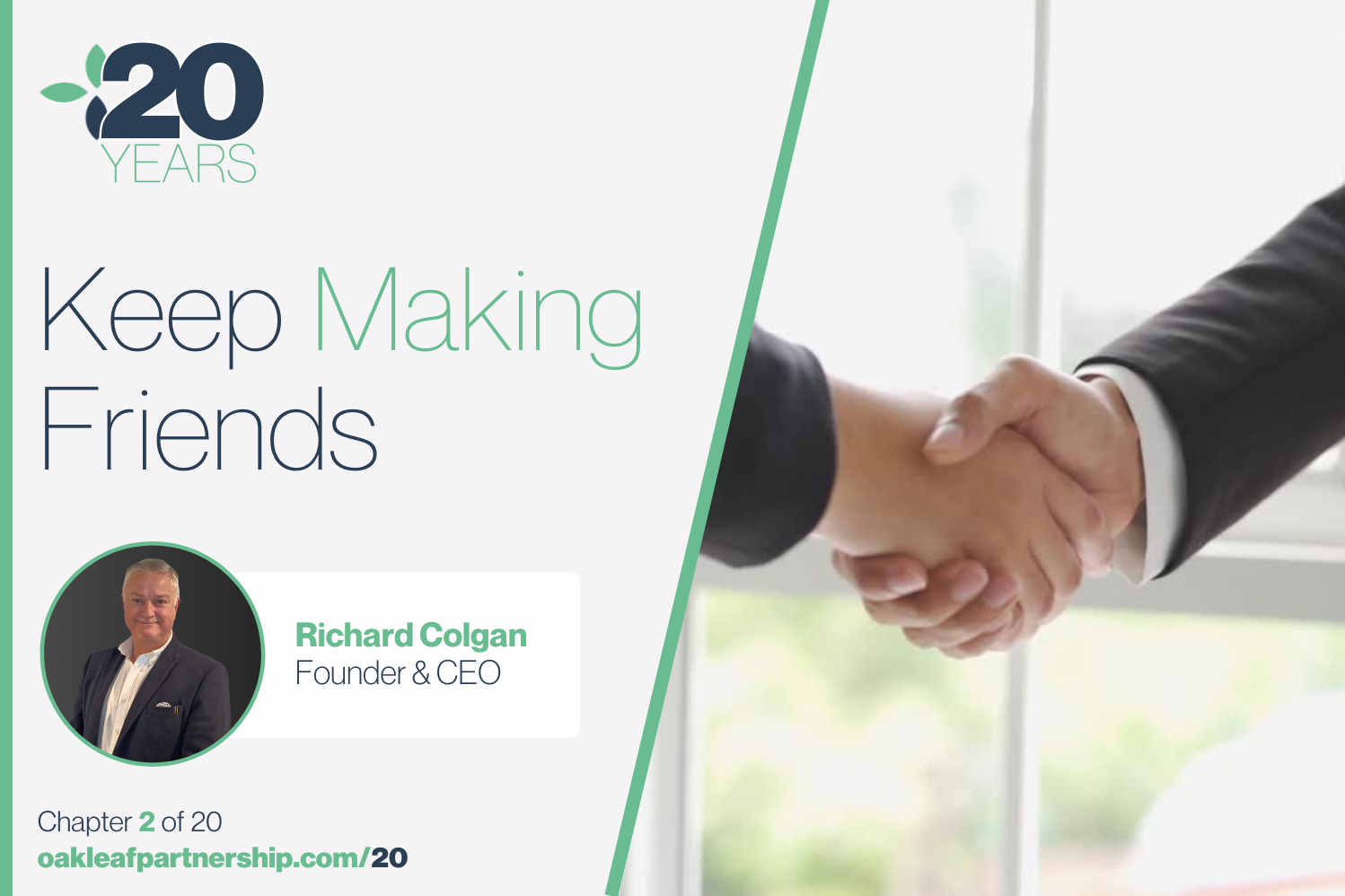
I’ve always lived by this mantra – it’s intellectually challenging, mutually beneficial and can be lots of fun. Even in the early days of Michael Page, I’d realised that basically clients and candidates were the same thing: customers! Why would they not be? It’s the morally correct way of doing business, after all.
The first week of Oakleaf involved a trip to buy sleeping bags, “Oakleaf sleeping bags”! Late nights out with customers seldom involved taxis or hotel rooms – we had no money yet! We just had a shared floor with the Middlesex Street mice!
HR in 2005 (or “Personnel” as lots of Personnel Directors referred to their function: “I’m not a resource, I’m a person”!) was starting to evolve from order taker to strategic partner (it still has some way to go in some sectors!). Different sectors embraced this evolution in varying degrees. The Investment Banks were streets ahead at the time, securing an endless supply of HR talent from (amongst others) Ford and M&S – both were top of the HR game at the time but didn’t have deep enough pockets! Despite this outstanding talent in-flow, the banks seemed to continually wrap themselves up in internal politics and some quite “challenging” cultural issues, that often started at the very top. One Reward Director once told me that she knew exactly how to get her own way with the CEO. I’ll leave that thought for you to ponder…
Bonuses were still being discussed over long, boozy lunches. If you weren’t prepared to “fit in” you might as well look for another role if you hadn’t already been managed out. I once had an impressive and high performing customer who didn’t agree with her boss on a professional issue. The debate didn’t go well – apparently her boss didn’t appreciate being challenged. As she left her office after the debate, the CPO followed her out and shouted across the whole HR floor: “Get back in here, young lady!”. Suffice to say, she politely declined the offer to continue the debate and left that afternoon! Internal meetings were often about who you could shaft in public (whilst minding your own back) as opposed how the team could achieve its collective goal. 5 days a week in the office, long hours, huge pressure, acute politics and big bonuses didn’t necessarily create the best behaviours.
At the time, Oakleaf was 99% City focussed but with the GFC storm clouds gathering all that was about to change. As the banks began to topple, live vacancies didn’t just gently fall away, they fell off a cliff! I have on first-hand authority that on a global MDs conference call on a Saturday, the CEO told them to buy company stock for a “once in a lifetime price” – many of them did just that and by Sunday night had lost it all when the firm went into Chapter 11. Fear drove obedience.
Pre-GFC, the City was huge fun but the crisis was an opportunity to learn and re-set. It was an opportunity to recognise cultural failing and inappropriate behaviors. For Oakleaf, it was a chance to make sure our own culture was all about our people and was aligned with my own values. We all spent far too long in the office to ever get that “Sunday evening” feeling.
Week1
The Beginning: All about courage
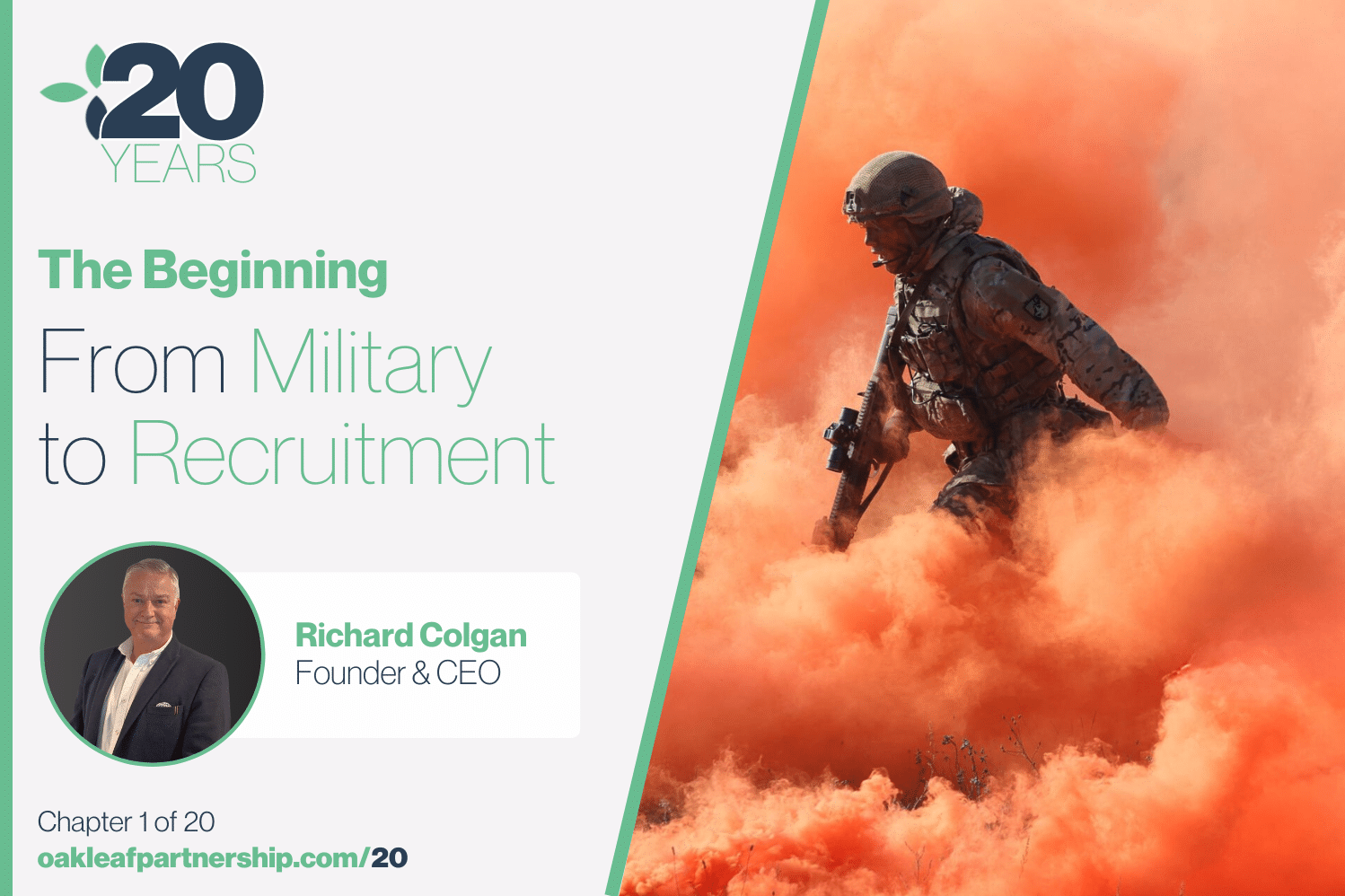
Today marks the start of a 20-week countdown to the 20th anniversary of Oakleaf Partnership (OP). Over the next 20 weeks I want to take you on both a personal and professional journey – musings and anecdotes from an era perhaps quite alien to Millennials today! Hopefully, you will indulge me and in return I hope to perhaps make you reflect and smile also (after all, there is precious little to make us smile at the moment!). Oh yes, and each episode will be written by my own fair hands with no “help” from AI!
As I enter my 60th year, nearly half of which has been in partnership with the HR profession (my long-suffering wife still sees OP as the “third person” in our marriage!), I still remember Monday 4th July 2005 like it was yesterday. With plenty of nerves and trepidation, combined with a good dose of optimism and courage (the Oakleaf is a symbol of courage after all) I walked from the bus stop on Bishopsgate to the new office. 131 Middlesex Street, above East End Cosmetics, was bathed in summer sunshine – it certainly wasn’t pretty, but I loved it. It felt liberating, exhilarating, scary but definitely the start of something special and a dream coming true. Perhaps, at last, I was going to be able to put into practice all the lessons I’d learnt from my time as an Army Officer.
I’d walked away from nearly 10 years at Michael Page with no guaranteed salary, no benefits, no guarantee of success just a courageous belief in my own abilities and a clear vision for the future. With a big mortgage and two young boys at private school, failure wasn’t an option! With hindsight, this really does typify what true entrepreneurialism is all about and should be both encouraged and the (significant!) risks rewarded appropriately. Would I do this again? I’m not certain I would: creating something out of nothing more than a name and a vision is hugely satisfying but the risks and sacrifices are no longer recognised. This may change in the future when our leaders understand the benefit of businesses like mine, and I suspect that UK plc will be a much better place as a result.
In my next instalment, I will take a look at the HR profession of 20 years ago, up to and including the GFC. Until next time…

